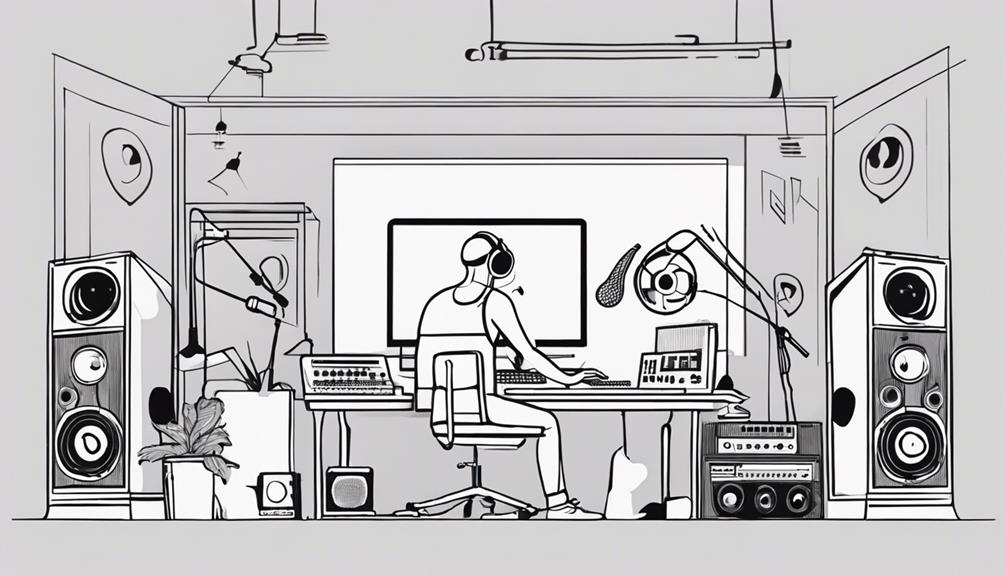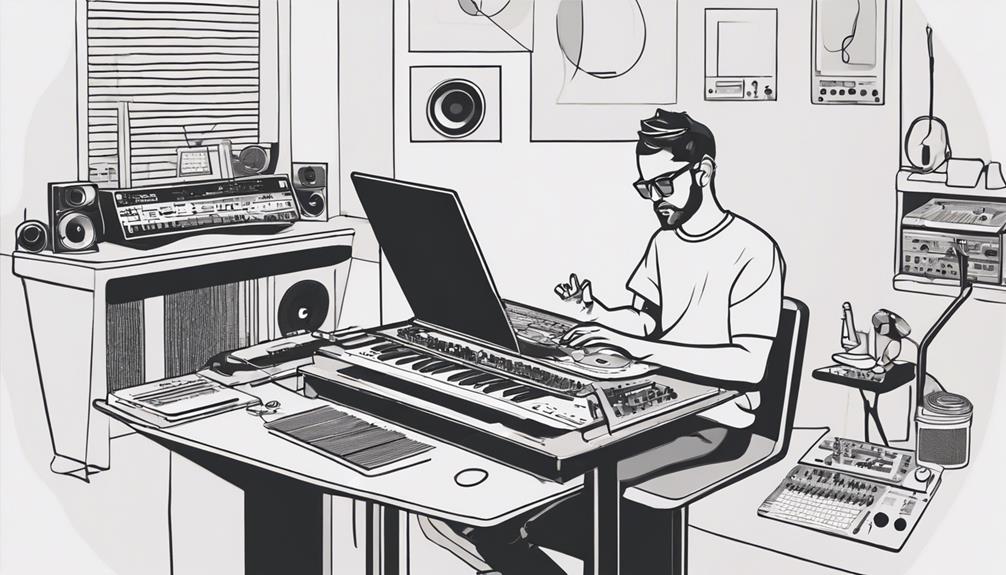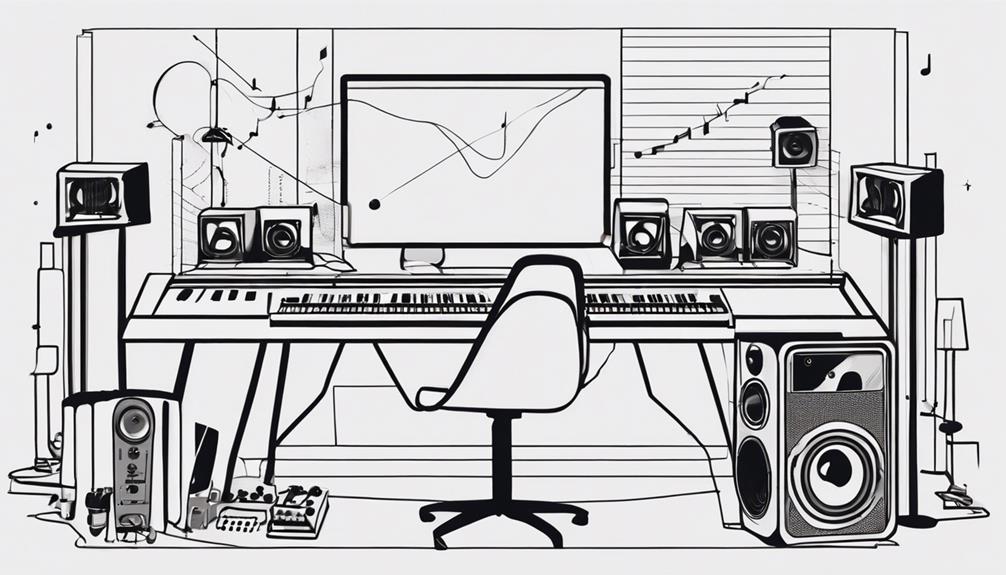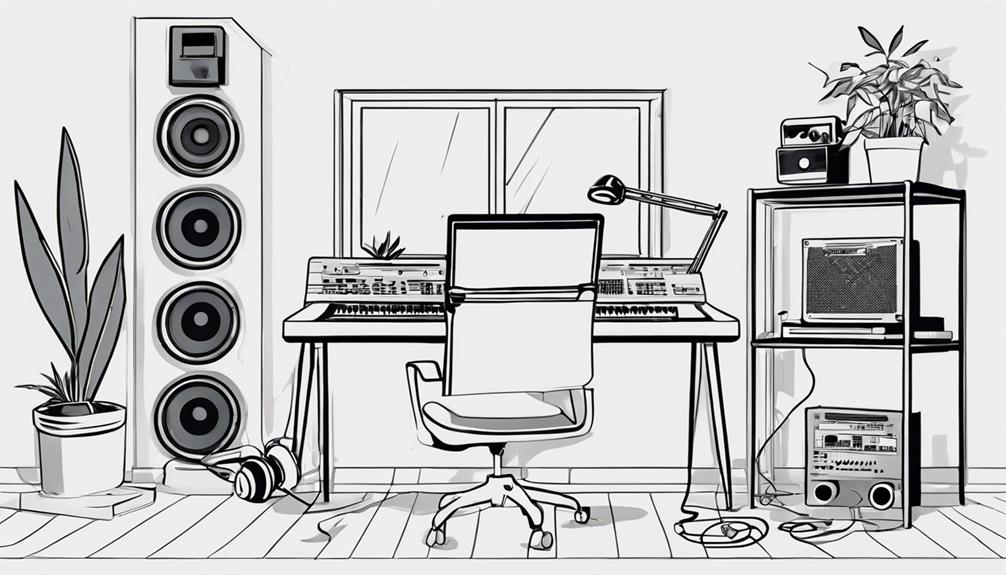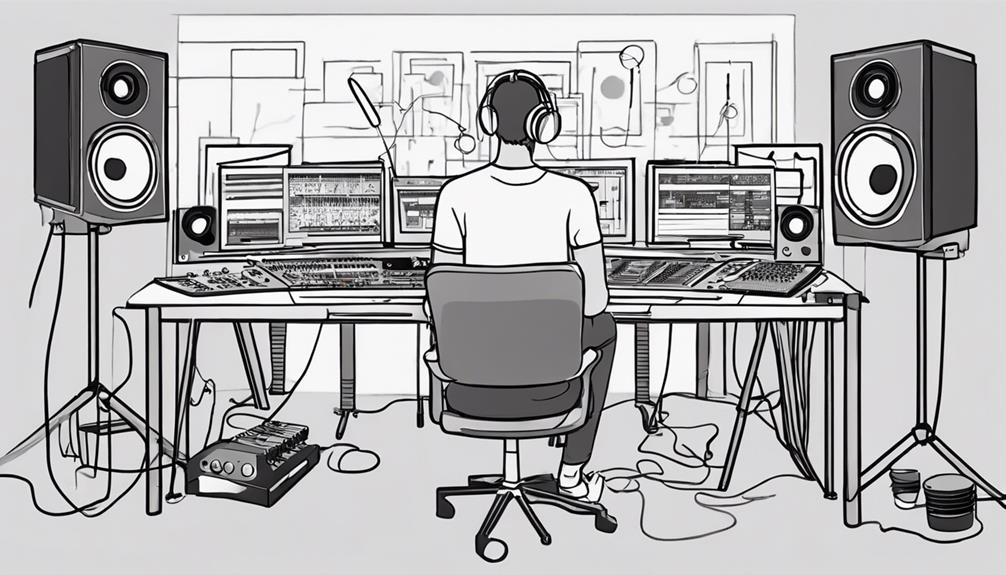Maximize your music production skills by selling beats online on global platforms. Showcase your expertise on platforms like Fiverr and Upwork. Create sample packs and presets for sites like Splice. Teach music production through courses. License your music for royalties and explore radio play opportunities. DJs can earn through live shows and festivals, while ghost-writing and selling beats provide continuous income. Utilize digital sales strategies and Bandcamp for direct fan engagement. Boost revenue from streaming by increasing listenership and understanding algorithms. Diversify income streams to maximize your earnings!
Key Takeaways
- Sell beats online to reach a global market.
- Showcase skills on platforms like Fiverr and Upwork.
- Create sample packs for platforms like Splice.
- Teach music production through online courses.
- License music to media outlets for royalties.
Sell Beats Online
Start selling your beats online to tap into a global market and monetize your music production skills effectively. Platforms like BeatStars and Airbit provide opportunities for music producers to sell their beats, allowing you to set your own prices and have control over your earnings.
By showcasing your beats on a personal website, you can attract a diverse audience from around the world, expanding your reach and potential customer base. Selling beats online not only offers a platform to generate revenue streams but also creates a passive income source for music producers.
Utilizing platforms like Soundee further enhances your ability to monetize your skills through beat sales, maximizing your earning potential. Consider exploring online courses to enhance your marketing strategies and improve your sales techniques, ultimately boosting your success in selling beats online and capitalizing on the global music market.
Offer Freelancing Services
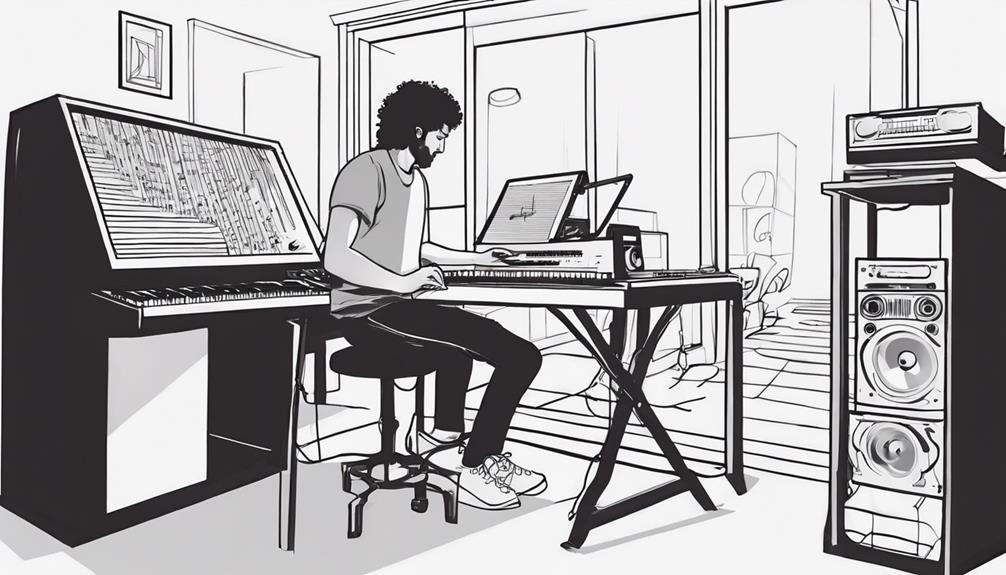
How can you capitalize on your music production skills by offering freelancing services?
Utilize platforms like Fiverr, Upwork, and SoundBetter to showcase your expertise in music production services such as mixing, mastering, composing, and sound design.
By networking with musicians, artists, and media professionals, you can expand your freelance opportunities and attract clients seeking professional music production.
Highlight your versatility, creativity, and professionalism to stand out in the competitive market and build a strong portfolio.
Find rewarding projects to work on as a freelancer in the music production industry, allowing you to gain experience and credibility.
By offering your services on platforms like Fiverr and Upwork, you can reach a broader audience and connect with clients looking for high-quality music production.
Take advantage of freelancing to monetize your skills and establish yourself as a sought-after music producer.
Create Sample Packs/Preset
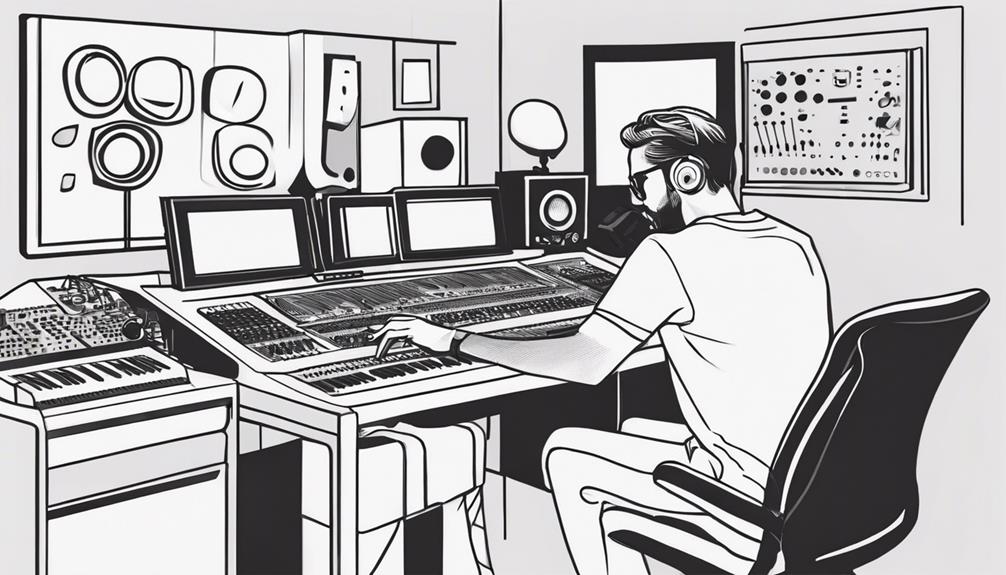
You can turn your unique sounds and presets into profit by creating sample packs and offering custom presets for sale. Platforms like Splice and Loopmasters provide avenues to reach a broader audience and generate income from your music production skills.
Selling sample packs allows you to showcase your signature sound and attract fellow producers looking for quality content.
Sell Sample Packs
Moreover, selling sample packs or presets is a lucrative way for music producers to monetize their skills and generate passive income. Sample packs are essential collections of audio files that aid in sound design and music creation. By creating and offering unique sample packs, you can attract a broad audience of producers seeking distinctive elements for their tracks.
Platforms like Splice, Loopmasters, or Producer Loops provide avenues for you to sell your sample packs and reach a wider market.
In addition, presets, which are pre-configured settings for software instruments, are popular among producers looking to enhance their sound design quickly. Crafting and selling presets tailored to specific genres or featuring vintage sounds can be a profitable venture.
Collaborating on commissioned sample packs can also open doors to revenue-sharing opportunities with platforms or fellow producers. Diversifying your offerings with sample packs and presets can establish multiple streams of income in the music production industry.
Offer Custom Presets
Wondering how to leverage your music production skills further? One lucrative avenue to explore is offering custom presets. By creating unique sound configurations and settings that showcase your signature style, you can cater to fellow music producers looking to elevate their productions. Designing presets tailored to different genres and production needs allows you to reach a broader audience and establish your expertise in sound design.
To kickstart your custom presets venture, consider the following strategies:
| Benefits | Tips | Tools |
|---|---|---|
| Showcase your style | Offer free demos | Synthesizers |
| Reach wider audience | Collaborate with other producers | Audio Effects |
| Establish expertise | Provide tutorials | Sample Libraries |
| Generate additional income | Offer discounts | MIDI Controllers |
Teach Music Production Online
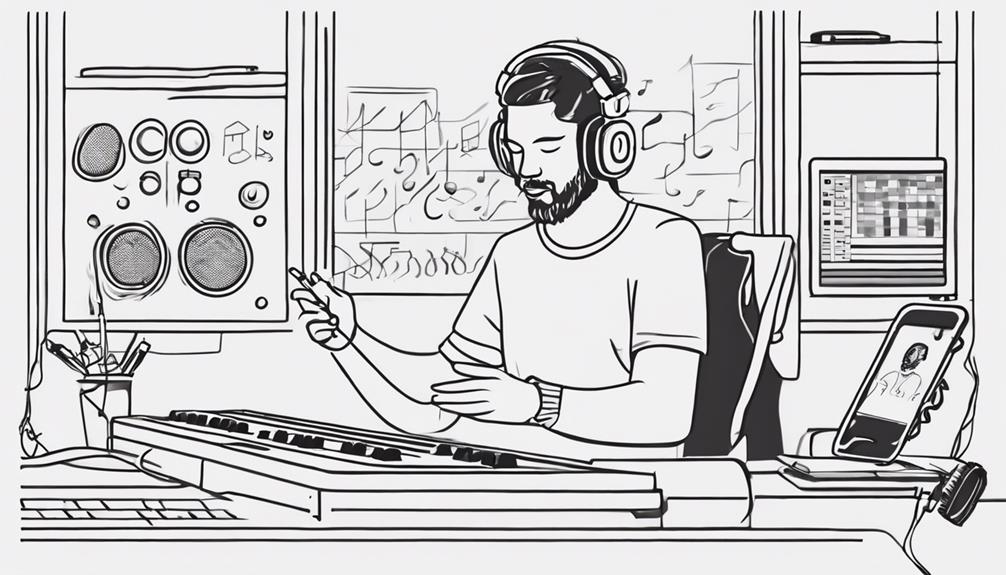
You can start earning by creating online courses or tutorials on music production. Platforms like Udemy, Skillshare, and YouTube offer great opportunities to showcase your expertise and make money.
Additionally, offering personalized coaching sessions can be a profitable way to teach music production online.
Online Tutorial Platforms
Utilize popular online tutorial platforms to share your expertise in music production and monetize your skills effectively. Platforms like Udemy, Skillshare, and YouTube offer fantastic opportunities to create and sell online courses teaching music production.
By offering valuable insights, tips, and techniques through video tutorials, you can engage and educate a global audience interested in mastering music production. Monetizing your passion for music production through online courses is a fulfilling way to share your skills and experience while generating income.
These platforms provide a structured and accessible format for sharing your knowledge, allowing you to reach a broader audience beyond geographical limitations. Through online courses, you can cater to the growing demand for learning music production from the comfort of one's home.
Embrace the digital era and leverage online tutorial platforms to showcase your expertise, connect with aspiring music producers, and create a sustainable income stream from your music production skills.
Personalized Coaching Sessions
To further capitalize on your music production skills and expand your earning potential, consider offering personalized coaching sessions to aspiring producers online. By delving into personalized coaching sessions, you can share your expertise while monetizing your passion for music production.
Here are some strategies to successfully teach music production online:
- Utilize online platforms like Udemy and Skillshare to create courses and tutorials.
- Offer live coaching and mentoring sessions to provide hands-on guidance to students.
- Engage with a global audience by providing virtual music production lessons.
- Conduct one-on-one sessions with students to tailor the learning experience to their specific needs.
Through personalized coaching sessions, you can't only help aspiring producers hone their skills but also establish a lucrative source of income by sharing your knowledge and passion for music production in a tailored and interactive online setting.
License Music to Media

Licensing music to media outlets is a strategic way to monetize your music production skills and reach a broader audience. By submitting your music to libraries, publishers, or directly pitching to music supervisors for film, TV, or video game projects, you can potentially have your music placed in various media outlets.
This exposure not only introduces your music to a wider audience but can also increase your recognition and earnings. When you license your music for commercial use, you earn royalties, turning your music production talents into a sustainable income source.
While navigating the world of music publishing and licensing can be challenging, the rewards of having your music featured in different media platforms make it a worthwhile endeavor. Embrace the opportunity to showcase your skills and creativity through media placements, as they can be a significant stepping stone in your music production career. Additionally, building relationships with music supervisors and staying informed about industry trends can increase your chances of success. By exploring various music production placement tips, such as tailoring your tracks to fit specific projects or maintaining a professional portfolio, you can make your work stand out. Consistency, persistence, and a willingness to adapt are key to unlocking exciting opportunities in this ever-evolving field.
Explore Radio Play/Royalties
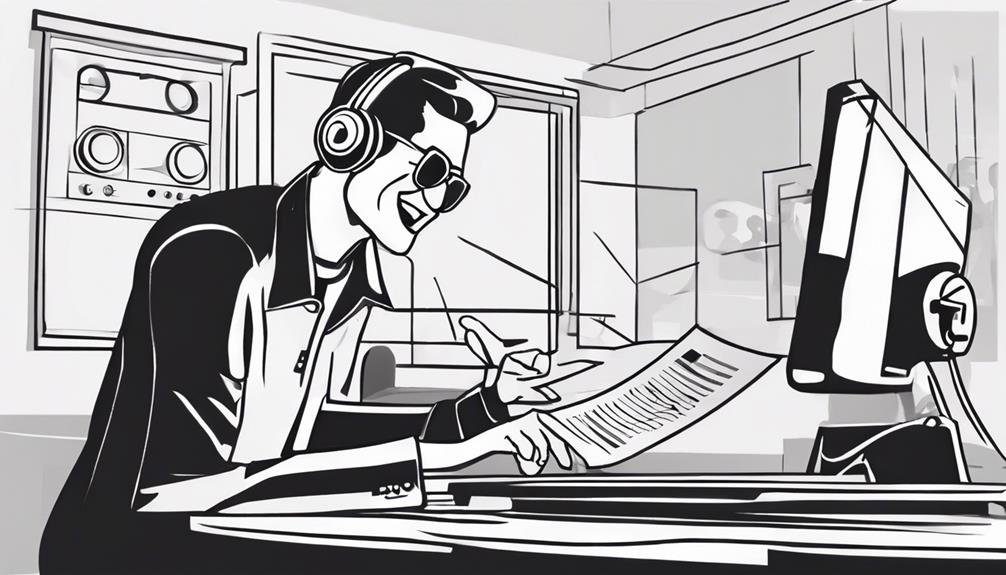
You should explore the world of radio play to tap into a potential revenue stream as a music producer.
Discover how royalties are collected through performance rights organizations like ASCAP, BMI, and SESAC.
Consider the importance of licensing your music for radio play to maximize your earnings.
Radio Play Importance
Given the importance of radio play in the music industry, comprehending its impact on a music producer's career is crucial for maximizing earnings and visibility. Radio play serves as a powerful tool for enhancing your presence in the industry and connecting you with a broader audience.
Here are some key points to keep in mind:
- Boost Visibility: Radio play can greatly increase your visibility and introduce your music to a larger audience.
- Steady Royalties: Royalties from radio play offer a continuous income stream, providing financial stability for music producers.
- Industry Recognition: Being featured on radio stations can lead to greater recognition within the music industry, opening up new opportunities for collaborations and projects.
- Fan Base Growth: Radio play helps in building a loyal fan base and generating interest in your work, ultimately leading to more support for your music endeavors.
Understanding the significance of radio play and actively tracking your royalties can pave the way for a successful and lucrative music production career.
Royalty Collection Methods
Understanding how royalties are collected through radio play is essential for music producers looking to maximize their earnings in the industry. Royalty collection methods for radio play involve tracking the frequency of airtime a song receives and compensating the music producers accordingly.
Performance rights organizations (PROs) such as ASCAP, BMI, and SESAC play an important role in collecting royalties for radio play and guaranteeing that music producers are paid for their work. These organizations use intricate formulas that consider factors like audience size and how often a song is played to calculate the royalties due to each music producer.
Licensing Considerations
Licensing considerations play a pivotal role in determining how music producers can monetize their skills through radio play and royalties. When it comes to maximizing your earnings in the music production industry, understanding the nuances of licensing for radio play is essential.
Here are some key points to keep in mind:
- Radio play can lead to significant royalties for music producers, based on airtime and audience reach.
- Royalties from radio play are typically distributed through performing rights organizations like ASCAP, BMI, and SESAC.
- Music producers can earn royalties from terrestrial radio, internet radio, and satellite radio broadcasts.
- The amount of royalties earned from radio play depends on factors like song popularity, airplay frequency, and station size.
DJing for Income
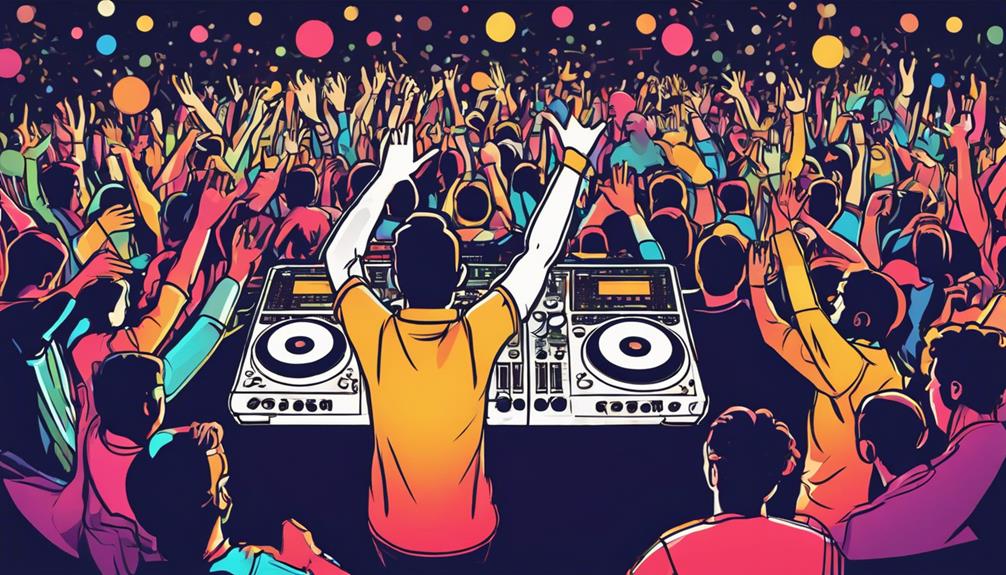
In order to DJ for income, you can tap into various opportunities to showcase your skills and generate revenue as a music producer. Many DJs find success in live showcases, club gigs, and music festivals, where they can't only make money but also gain exposure and build a following.
Selling merchandise at gigs is another way for DJs to bring in extra cash and promote their brand. Additionally, promoting your music production services during your DJ sets can attract new clients and increase your earnings. For new producers, DJing can be a great way to break into the industry and start making money from their music.
Exploring different avenues such as ghost-writing and selling beats to artists, as well as offering tutoring services to aspiring music producers, can be crucial. By diversifying your income streams and staying active in the DJ scene, you can maximize your earning potential and establish yourself as a successful music producer.
Ghost-Writing/Selling Beats
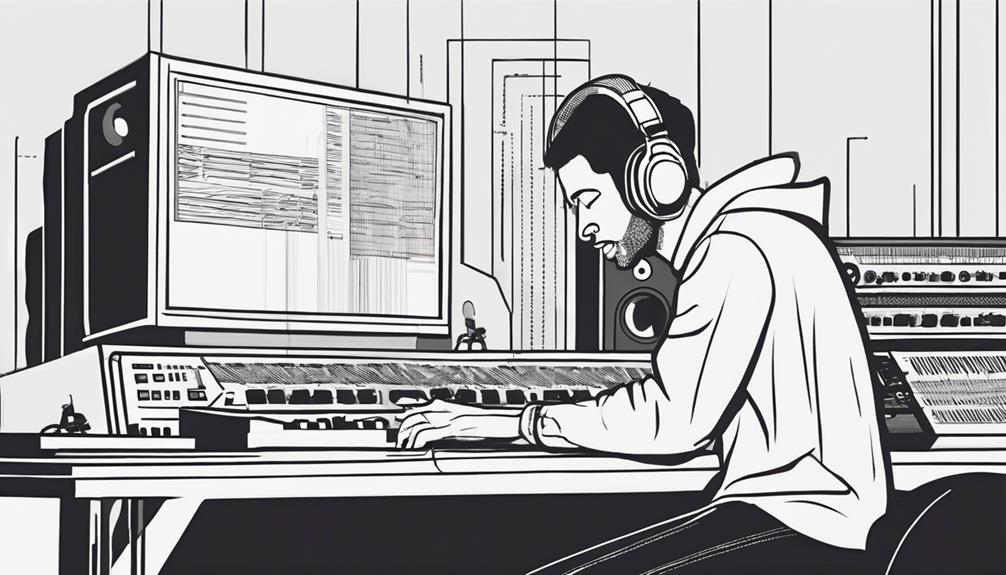
Creating music anonymously for artists or producers to use as their own is the essence of ghost-writing in the music industry. This practice allows you to showcase your skills without necessarily receiving public credit.
When it comes to selling beats, you have the opportunity to provide instrumental tracks for artists to use in their music projects. This can be a great source of passive income, especially when utilizing online platforms like BeatStars or Airbit.
Ghost-writing and selling beats both require a strong understanding of music production and the latest industry trends. Engaging in these activities can't only lead to financial gains but also open doors to exciting partnerships and opportunities within the music industry.
- Ghost-writing offers a chance to collaborate with various artists and producers discreetly.
- Selling beats online can provide a continuous stream of income once you establish your presence.
- Understanding the market demand and trends is essential for success in ghost-writing and beat selling.
- Building a strong portfolio is vital to attract potential clients and buyers in the competitive music production market.
Digital Sales Strategies
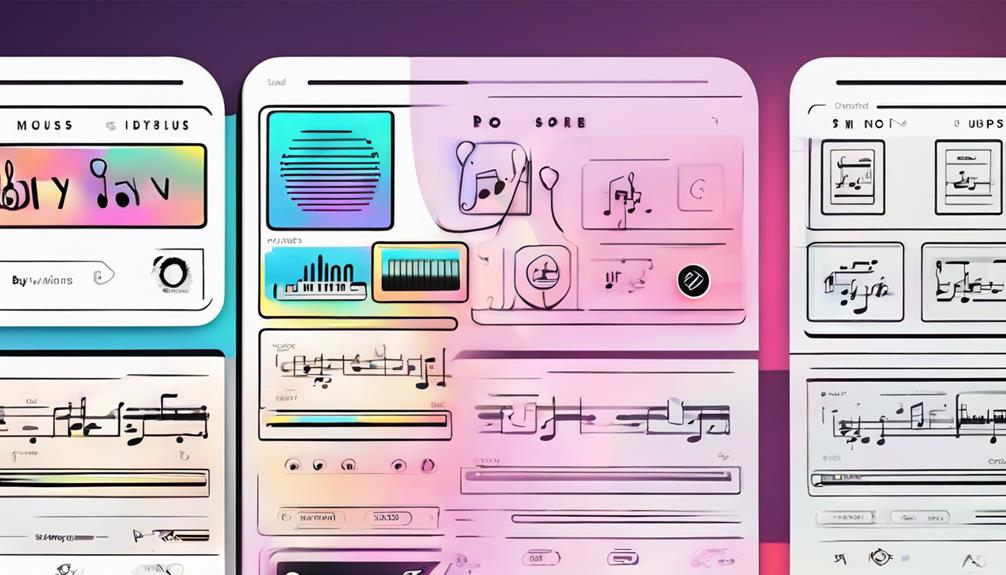
Ghost-writing and selling beats can serve as valuable avenues for showcasing your music production skills, and exploring digital sales strategies further enhances your ability to monetize your talents effectively.
Platforms like Traxsource, Juno Download, and Beatport offer independent artists opportunities to sell their music digitally. Bandcamp, on the other hand, allows artists to directly connect with fans and sell both digital music and physical merchandise.
Leveraging these digital sales platforms enables independent artists to reach a global audience and generate revenue from their music sales. Collaborating with labels that have distribution deals can also help artists expand their reach and maximize digital sales opportunities.
Understanding the importance of digital sales revenue is vital for music producers aiming to monetize their skills successfully. By tapping into these digital sales strategies, independent artists can create sustainable income streams and grow their presence in the music industry.
Generate Revenue From Streaming
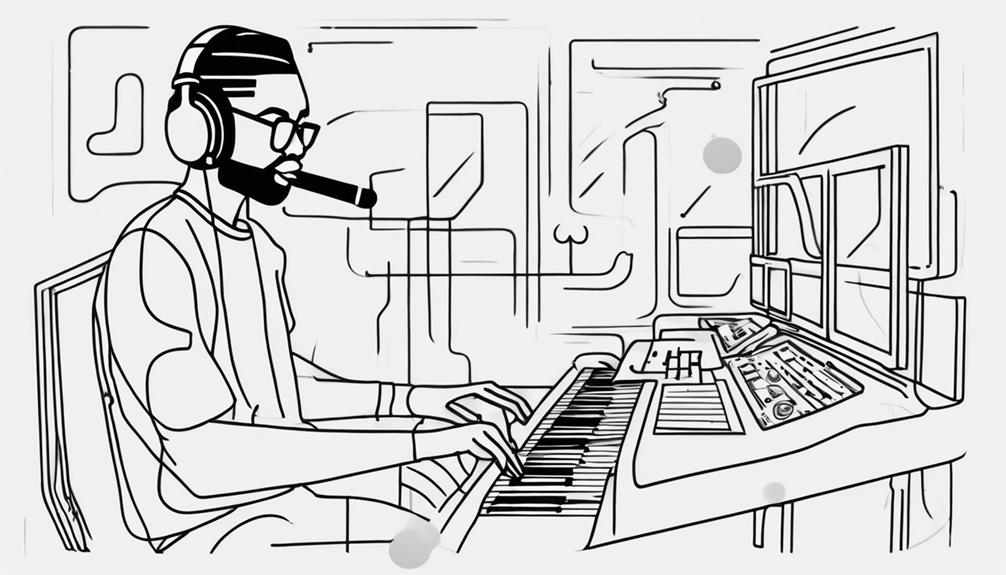
To generate revenue from streaming, music producers can leverage various platforms like Spotify, Apple Music, and Tidal that offer royalties based on plays.
Here are some tips to help you make money from music on streaming sites:
- Artists typically earn around $0.004 to $0.0084 per stream on Spotify.
- Increasing listenership and engagement can boost streaming revenue for music producers.
- Diversifying across multiple streaming platforms can maximize income opportunities.
- Understanding streaming algorithms and marketing strategies can help increase visibility and earnings.
Frequently Asked Questions
How Can I Make Money With Music Skills?
To make money with music skills, you can sell beats online, offer freelance services for mixing, mastering, etc., create and sell sample packs, teach music production online, or license your music to media outlets for royalties.
How to Make Money From Music Production?
To make money from music production, you need to diversify your income streams. Explore avenues like streaming royalties, beat sales, and offering online courses. Collaborate with artists, license your music, and sell sample packs for multiple revenue sources.
How Do You Monetize Music Industry?
To monetize the music industry, you need to leverage various revenue streams like streaming royalties, music sales, and licensing deals. Offer services on platforms like Upwork, create and sell sample packs, and build a strong online presence to attract clients.
Is Music Production a Good Side Hustle?
Thinking of music production as a side hustle? Absolutely! With passion and commitment, you can turn beats into bucks. Embrace flexibility, tap into the digital wave, and hustle smart. Your groove, your gain!
Conclusion
Now that you've discovered how to monetize your music production skills, it's time to put these strategies into action and start earning from your passion.
Remember, the key is to stay consistent, be creative, and always look for new opportunities to showcase your talent.
By implementing these tips, you'll be well on your way to turning your love for music production into a profitable venture.
Keep creating and making money doing what you love!

